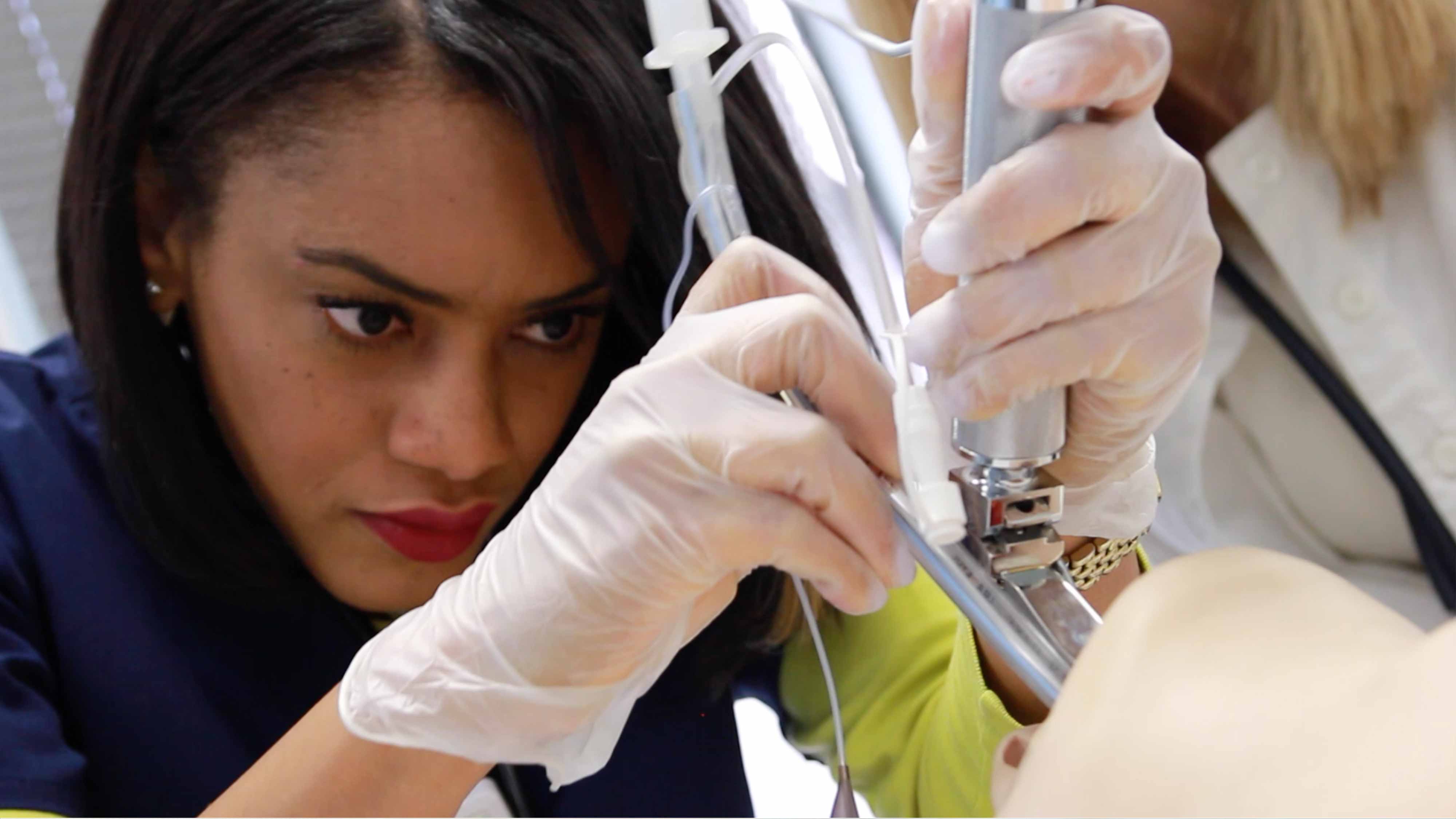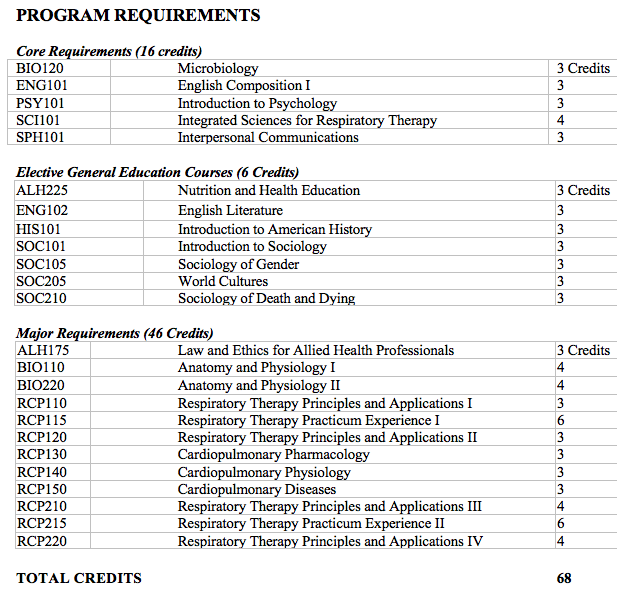
ONLINE APPLICATION MANDL IN THE NEWS
A.A.S in Respiratory Therapy
68 Credits
Program Length: 75 Weeks
Total Clock Hours: 1875
As one of the top Respiratory Therapy schools in NYC, Mandl School, The College of Allied Health works to meet the needs of our nation’s dynamic, fast-paced health care field. This industry is evolving rapidly and demands well-trained, licensed respiratory therapists and respiratory therapy technicians to staff hospitals, sleep labs and other health-related facilities.
Our nation’s dynamic, fast-paced health care field is evolving rapidly and requires well-trained educated, and competent licensed respiratory therapists to staff hospitals, sleep labs and other health-related facilities. Employment in Respiratory Therapy is expected to grow rapidly according to the U.S. Bureau of Labor Statistics. The Associate in Applied Science in Respiratory Therapy introduces students to the knowledge and skills necessary to obtain entry level positions in respiratory care as respiratory therapists. At the direction of a licensed physician, a respiratory therapist evaluates and treats cardiopulmonary (lungs and heart) health. This includes teaching patients and their families about treatment and maintenance of pulmonary health problems, including the use of respiratory therapy equipment and medications. Respiratory therapists perform these services under the supervision of a licensed respiratory therapist or a licensed physician.
 There are two levels of respiratory therapist: the certified respiratory therapist (CRT) and the registered respiratory therapist (RRT). Upon graduation from the Associate in Applied Science degree program in Respiratory Therapy at Mandl, graduates are eligible to take a voluntary national examination to obtain respiratory therapy credentials. The graduate must take the Therapist Multiple Choice (TMC) Examination first. There are two established cut scores for the TMC Examination. Achieving the low cut score awards the Certified Respiratory Therapist (CRT) credential. Candidates who achieve the high cut score become eligible to take the Clinical Simulation Examination (CSE). Candidates who then pass the CSE are awarded the Registered Respiratory Therapist (RRT) credential.
There are two levels of respiratory therapist: the certified respiratory therapist (CRT) and the registered respiratory therapist (RRT). Upon graduation from the Associate in Applied Science degree program in Respiratory Therapy at Mandl, graduates are eligible to take a voluntary national examination to obtain respiratory therapy credentials. The graduate must take the Therapist Multiple Choice (TMC) Examination first. There are two established cut scores for the TMC Examination. Achieving the low cut score awards the Certified Respiratory Therapist (CRT) credential. Candidates who achieve the high cut score become eligible to take the Clinical Simulation Examination (CSE). Candidates who then pass the CSE are awarded the Registered Respiratory Therapist (RRT) credential.
The objective of the Respiratory Therapy Program is to provide students with a learning environment that will enable them to acquire requisite knowledge and skills to practice the profession of respiratory therapy, which shall be undertaken pursuant to the direction of a duly licensed physician and is defined as the performance of cardiopulmonary evaluation, respiratory therapy treatment techniques, and education of the patient, family and public.
The Respiratory Therapy program goals:
-
- The overarching goal is to prepare graduates with demonstrated competence in the cognitive (knowledge), psychomotor (skills), and affective (behavior) learning domains of respiratory care practice as performed by registered respiratory therapists (RRT’s).
The program trains respiratory therapists to determine the state of a patient’s cardiopulmonary health by running tests to identify such things as arterial blood gases, lung volume, and pulmonary infection, among others and to:
-
-
- set up and monitor therapeutic gases (e.g., oxygen) and environmental control systems;
- initiate and support a breathing apparatus (mechanical ventilator);
- insert and maintain an artificial airway;
- administer medications needed for respiratory care;
- provide cardiopulmonary rehabilitation
- help patients and their families by providing consumer education
- teach patients and families the proper use of equipment designed to aid respiration or administer needed gases or medication;
- train patients in adaptive techniques or strengthening exercises; and
- provide patients with orientation for procedures used to clear the respiratory system
-
The practice of the profession of respiratory therapy, which shall be undertaken pursuant to the direction of a duly licensed physician, is defined as the performance of cardiopulmonary evaluation, respiratory therapy treatment techniques, and education of the patient, family and public.
-
-
- Evaluation shall include the acquisition, analysis and interpretation of data obtained from physiological specimens, performing diagnostic tests, studies and research of the cardiopulmonary system and neurophysiological studies related to respiratory care.
- Therapy shall include the application and monitoring of medical gases (excluding anesthetic gases) and environmental control systems, mechanical ventilatory support, artificial airway care, bronchopulmonary hygiene, pharmacologic agents related to respiratory care procedures, and cardiopulmonary rehabilitation related and limited to respiratory care.
- Respiratory therapy services may be performed pursuant to a prescription of a licensed physician or certified nurse practitioner.
-
To be employed as a respiratory therapist in New York State, graduates of the program must take and pass the TMC Examination designed to objectively measure essential knowledge, skills, and abilities required of entry-level respiratory therapist and administered by the National Board for Respiratory Care (NBRC). The CRT high-cut score is a pre-requisite for the CSE Exam (Clinical Simulation Exam). Individuals who attempt both parts of the examination and achieve passing scores will be awarded the Registered Respiratory Therapist (RRT) credential. It must be noted that graduates of accredited respiratory care education programs have one year after graduation to complete the CRT and three years after obtaining the CRT to complete the CSE Examination.

The Respiratory Therapy Program of the Mandl School is a two-year Associate of Applied Sciences Degree Program and is programmatically accredited by The Commission on Accreditation for Respiratory Care (CoARC). Its website address is www.coarc.com
CoARC accredits respiratory therapy education programs in the United States. To achieve this end, it utilizes an ‘outcomes based’ process. Programmatic outcomes are performance indicators that reflect the extent to which the educational goals of the program are achieved and by which program effectiveness is documented. This link provides outcomes data for all accredited programs: coarc.com/students/programmatic-outcomes-data/
Mandl’s CoARC Program number: 200611
Mandl’s Respiratory Therapy program is nationally accredited by The Accreditation Bureau for Health Education Schools (ABHES). Its website address is www.abhes.org
Student Learning Outcomes Mandl School
Mandl School